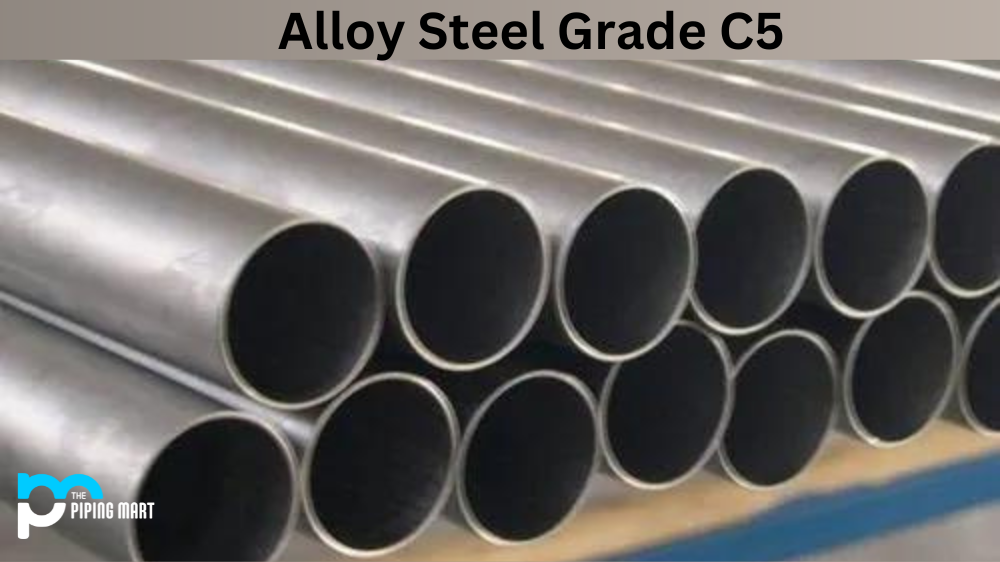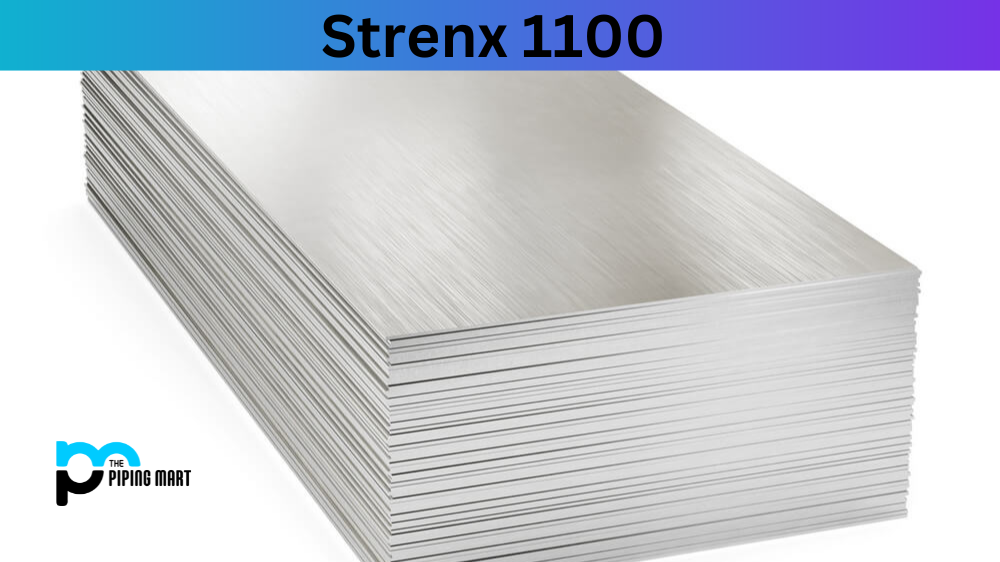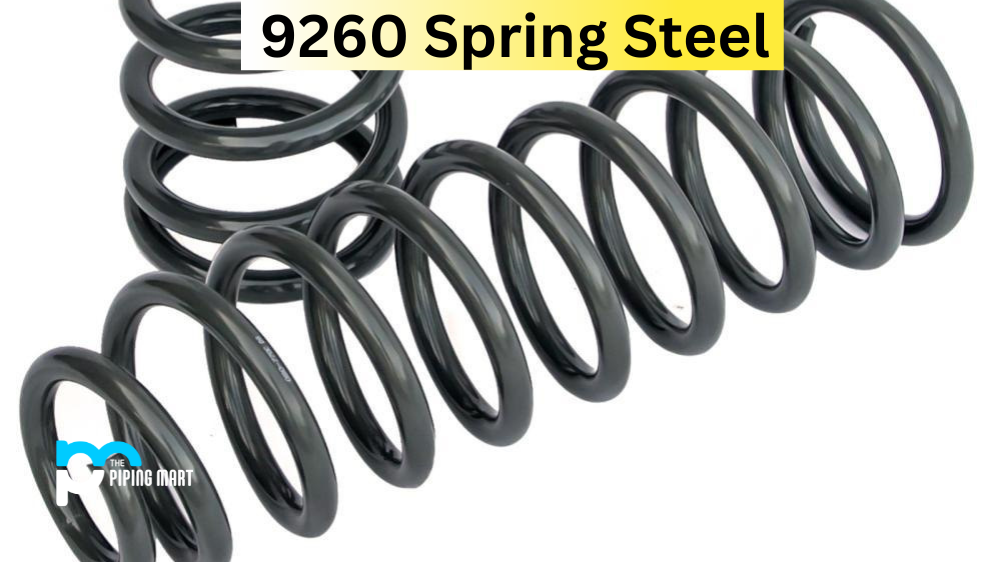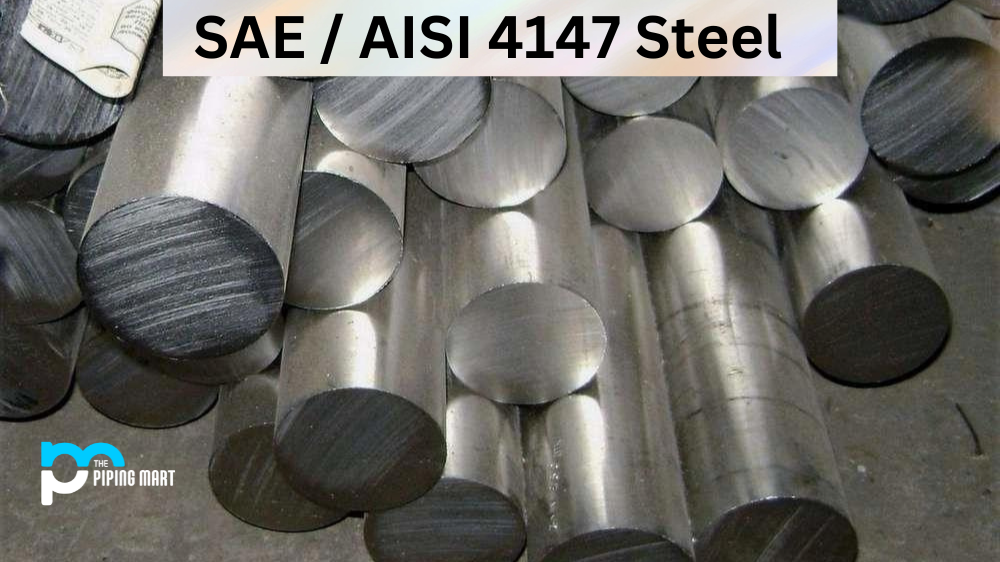Alloy steel grade C5 is a versatile alloy often used in construction and other industries. It is composed of a range of elements, with each element offering unique chemical, physical, mechanical, and corrosion-resistant properties that make it well-suited for many applications. This blog post will explore the composition, properties, uses, and machining of alloy steel grade C5.
C5 Steel Composition
Alloy Steel Grade C5 is an alloy steel composed primarily of carbon (C) and manganese (Mn). It also contains small amounts of molybdenum (Mo), silicon (Si), phosphorus (P), sulfur (S), Chromium (Cr), nickel (Ni), copper (Cu), and vanadium (V). Each element contributes to the overall properties of the alloy in different ways. For example, Chromium increases hardness by forming a thin oxide layer on the surface which prevents further oxidation; Molybdenum enhances strength and heat resistance; Copper improves electrical conductivity; Nickel increases strength at higher temperatures; Vanadium increases wear resistance; Silicon adds strength without adding weight. The combination of these elements creates an alloy with excellent tensile strength and good ductility.
| Carbon | 0.20% Max |
| Manganese | 0.40 – 0.70% |
| Silicon | 0.75% Max |
| Phosphorus | 0.04% Max |
| Sulfur | 0.045% Max |
| Chromium | 4.00 – 6.50% |
| Nickel | 0.50% Max |
| Molybdenum | 0.45 – 0.65% |
| Tungsten | 0.10% Max |
| Copper | 0.50% Max |
| Residual Elements | 1.00% Max |
C5 Steel Chemical properties
Due to its chemical makeup, Steel C5 is considered a high-strength, low-alloy steel grade. It features a very low carbon content, making it easier to form and weld than higher carbon grades. It also contains trace amounts of manganese, sulfur, phosphorus, silicon and Chromium, which all work together to increase C5’s resistance to corrosion and wear and improve its tensile strength. Alloy Steel Grade C5 is ideal when a relatively strong metal is needed without the cost or workability associated with higher carbon grades. Its versatile properties make it suitable for numerous applications, such as oil and gas drilling components, building and construction equipment and fasteners.
C5 Steel Mechanical Properties
Alloy C5 mechanical properties are particularly interesting to engineers working with this material in industrial settings. It has high strength and hardness, excellent ductility, wear resistance, toughness, and fatigue properties. This makes it ideally suited for various applications, including components used in the aerospace industry and power generation equipment, as well as dishes and cutlery items. It offers impressive performance even under extreme temperature conditions, which is another attractive feature of this type of alloy steel. For those looking to create quality products that can withstand rigorous operational conditions while still preserving efficiency, Alloy Steel Grade C5 offers a compelling choice.
| Tensile Strength | 90 – 115 ksi |
| Yield Strength | 60 ksi Min |
| Elongation at 2 in. | 18% Min |
| Reduction of Area | 35% Min |
C5 Steel Physical Properties
Grade C5 has several beneficial properties, including high tensile strength, good ductility, excellent corrosion resistance, good wear resistance, good heat resistance and low thermal expansion rate. It also has good machinability with relatively low friction when machined due to its high chromium content. Its high corrosion resistance makes it ideal for use in corrosive environments such as those found in chemical plants or offshore platforms.
Corrosion Resistance
Alloy Steel C5 is an ideal choice for those who need superior corrosion resistance in their projects – from automotive parts to gas storage tanks. This steel alloy contains high levels of Chromium and molybdenum, which together create a layer of resistance that protects it from environmental factors such as rust and oxidation. With the right combination of care and maintenance, this alloy can retain it’s superior protection even under extreme conditions like constant temperatures and humidity. Having a reliable source of corrosion resistant material is essential for any project, and Alloy Steel Grade C5 provides exactly that.
Heat Treatment
Alloy Steel Grade C5 is a type of steel that can endure high temperatures, making it ideal for difficult finishes and treatments. Heat treatment greatly increases the strength and toughness of Alloy Steel Grade C5 components by enhancing the various mechanical properties; this involves heating the steel at a certain temperature, followed by cooling or quenching. Although heat treatment makes Alloy Steel Grade C5 more durable and reliable, it needs to be done carefully to avoid losing any mechanical advantages due to over-tempering. This grade’s most common heat-treat processes include tempering, normalizing, hardening, and annealing. Properly employing these processes will enable businesses and products requiring extreme durability to capitalize on the strength provided by Alloy Steel Grade C5.
Welding
Alloy Steel Grade C5 welding is a process that requires precision and skill for successful results. But, with the right kinds of equipment, the right approach to preparation, and knowledge of the nature of the metals being joined together, alloy steel grade C5 welding can be very reliable and cost effective. Safety is always paramount in any welding job and applied more strongly when working with extreme temperatures associated with Alloy Steel Grade C5. It is important to understand the metallurgy of the materials being welded to ensure that strength and corrosion resistance factors need to be considered. With a professional approach to preparation and execution, Alloy Steel welding may become a rewarding endeavor.
Heat Resistant
Its heat resistant properties make it suitable for use in high temperature applications such as turbines or exhaust systems while its wear resistant qualities make it suitable for use as machine parts or components that are subjected to heavy loads or abrasive forces.
Uses
Due to its wide range of beneficial properties, Alloy Steel Grade C5 finds use in a variety of industries such as construction, automotive manufacturing , aerospace engineering , petrochemical processing , oil refining , mining equipment manufacturing , energy production , agricultural machinery production , food processing machinery production , transportation equipment manufacturing .
Machining
It can be machined using conventional methods such as turning, milling or drilling but should be done with caution due to its tendency to work harden quickly when subjected to thermal stress during machining operations. Different grades may require different cutting tools depending on their hardness level so it is important to select the correct tooling before beginning any machining operation on this alloy type.
Conclusion
Alloy steel grade C5 is a versatile material with many impressive physical and mechanical properties making it suitable for use in many industries where corrosion resistance and heat resistance are critical factors. Its composition provides excellent tensile strength while maintaining good ductility, making it easy to work with. Its chromium content gives it excellent wear resistance, making it suitable for heavy load-bearing applications or components exposed to abrasive forces regularly. With careful selection of tooling during machining operations, this material can produce quality parts quickly and efficiently, saving time and money in production costs over time. For these reasons Alloy Steel Grade C5 is sure to remain a popular choice among industry professionals looking for reliable results from their materials time after time!
Meet Heer, a dynamic and driven writer learning tricks of her trade in the metal industry. With a background in Digital Marketing, Heer brings a unique perspective to her writing, sharing valuable insights. Apart from blogging she like reading and hiking.




